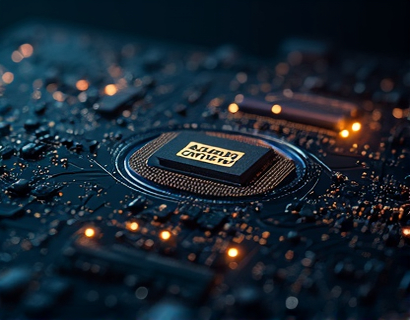Smart Contract Solutions for Pegged Token Creation and Seamless UCASH Exchange in Decentralized Finance
In the rapidly evolving landscape of decentralized finance, or DeFi, smart contracts have emerged as a pivotal technology, transforming the way digital currencies are created and managed. One of the most significant applications of smart contracts is in the creation of stable digital currencies pegged to leading tokens, such as UCASH, and enabling seamless bidirectional trading. This innovative approach not only enhances the stability and flexibility of DeFi but also sets a new standard for digital currency management in the modern economy.
Smart contracts, self-executing contracts with the terms directly written into code, offer a secure, efficient, and transparent method for creating pegged tokens. These tokens, also known as stablecoins, are designed to maintain a stable value relative to a specific asset, commodity, or currency, in this case, UCASH. The use of smart contracts in this process ensures that the peg is maintained automatically, without the need for intermediaries, thus reducing costs and increasing trust in the system.
Understanding Pegged Tokens and Their Importance
Pegged tokens, or stablecoins, are digital currencies that are pegged to the value of another asset, such as UCASH, to minimize volatility. This stability is crucial for various DeFi applications, including lending, borrowing, and trading, where price predictability is essential. Traditional stablecoins rely on reserve models, where a portion of the circulating tokens is held as collateral to ensure the peg. However, this model can be vulnerable to runs on the reserve and lacks transparency.
Smart contracts offer a more robust solution by automating the peg mechanism. When a token is created, smart contracts automatically manage the supply and reserve assets, ensuring that the token's value remains tied to UCASH. This automation reduces the risk of human error and manipulation, providing a more reliable and trustworthy system.
How Smart Contracts Enable Pegged Token Creation
The process of creating a pegged token using smart contracts involves several key steps. First, a smart contract is deployed on a blockchain, such as Ethereum, which contains the rules and logic for maintaining the peg. This contract is programmed to monitor the supply of the token and the reserve asset, ensuring that the ratio between them remains constant.
When a user wants to create new tokens, they deposit UCASH into the smart contract. The contract then generates an equivalent amount of the new token and releases it to the user. Simultaneously, the contract deducts the deposited UCASH from its reserve. If the token price starts to deviate from the peg, the smart contract automatically adjusts by either burning excess tokens or minting new ones to restore the balance.
Conversely, when a user wants to redeem tokens for UCASH, they send the tokens back to the smart contract. The contract verifies the token balance and, if sufficient, releases the corresponding amount of UCASH to the user while updating the reserve. This bidirectional process ensures that the token remains pegged to UCASH at all times.
Benefits of Smart Contract-Based Pegged Tokens
The use of smart contracts in creating pegged tokens offers numerous advantages over traditional methods. One of the primary benefits is transparency. All transactions and contract logic are recorded on the blockchain, making the system open and verifiable by anyone. This transparency builds trust among users and reduces the risk of fraudulent activities.
Another significant advantage is efficiency. Smart contracts automate the entire peg management process, eliminating the need for manual intervention and reducing transaction costs. This efficiency is particularly beneficial in DeFi, where speed and low costs are critical for user adoption and system scalability.
Security is also a paramount concern in DeFi, and smart contracts enhance it by removing single points of failure. Since the contract logic is decentralized and executed on a public blockchain, there is no central authority that can manipulate the system. This decentralization makes the system more resilient to attacks and failures.
Seamless Bidirectional Trading
One of the most compelling features of smart contract-based pegged tokens is the ability to engage in seamless bidirectional trading. Users can easily convert tokens to UCASH and back without the hassle of intermediaries or significant delays. This flexibility is crucial for traders and investors who need to manage their assets across different platforms and markets.
The smart contract ensures that the exchange rates are always up-to-date and reflective of the current market conditions. As the price of UCASH fluctuates, the smart contract adjusts the token price accordingly, maintaining the peg. This real-time adjustment ensures that users always have access to fair and accurate exchange rates, enhancing the overall trading experience.
Enhancing Decentralized Finance with Pegged Tokens
The integration of smart contract-based pegged tokens into DeFi ecosystems significantly enhances the functionality and appeal of these platforms. Pegged tokens provide a stable store of value and a reliable medium of exchange, which are essential components of a robust DeFi system.
For instance, in lending and borrowing protocols, stablecoins can be used as collateral, reducing the risk of price volatility affecting the loan's value. This stability makes DeFi more accessible to a broader range of users, including those who are risk-averse. Additionally, the use of pegged tokens in decentralized exchanges (DEXs) allows for more efficient and fair trading, as the smart contracts ensure that the trading pairs remain stable and trustworthy.
Challenges and Considerations
While smart contract-based pegged tokens offer many advantages, there are also challenges and considerations that need to be addressed. One of the primary concerns is the smart contract's security. Any vulnerabilities in the contract code can be exploited, leading to potential losses for users. Therefore, rigorous testing and auditing of smart contracts are essential to ensure their reliability and security.
Another consideration is the regulatory environment. As DeFi and stablecoins continue to grow, regulatory bodies are starting to take notice. Compliance with regulations is crucial to avoid legal issues and ensure the sustainability of these projects. Developers must stay informed about regulatory changes and design their smart contracts to meet compliance requirements.
Future Prospects and Innovations
The future of smart contract-based pegged tokens looks promising, with ongoing innovations aimed at addressing current challenges and enhancing user experience. One area of focus is the development of more sophisticated peg mechanisms that can adapt to market conditions more dynamically. For example, some projects are exploring the use of algorithmic stablecoins that adjust the supply based on market demand, in addition to maintaining a reserve.
Interoperability is another key area of innovation. As different blockchain platforms emerge, the ability to create and trade pegged tokens across multiple chains will enhance the utility and reach of these assets. Cross-chain solutions and atomic swaps are being developed to facilitate seamless token transfers between different ecosystems.
Furthermore, the integration of advanced features such as yield farming, staking, and decentralized governance will make pegged tokens even more attractive to users. These features not only enhance the financial returns but also empower users to have a say in the development and management of the token projects.
Conclusion
Smart contract solutions for pegged token creation and seamless UCASH exchange represent a significant advancement in DeFi. By providing secure, efficient, and user-friendly tools, these technologies are reshaping the landscape of digital finance. As the ecosystem continues to evolve, the potential for innovation and growth remains vast, offering exciting opportunities for cryptocurrency enthusiasts and DeFi innovators alike.










































